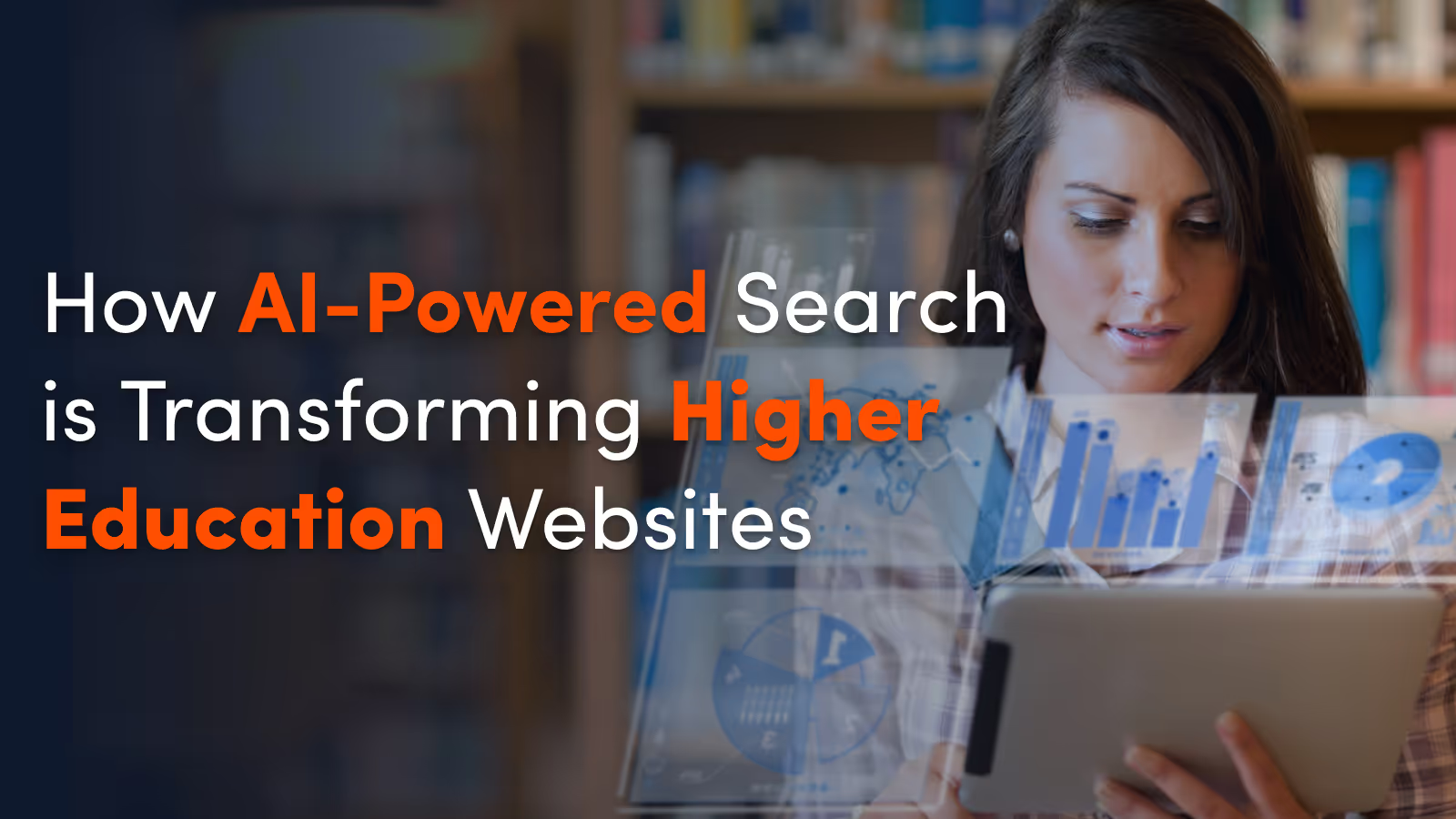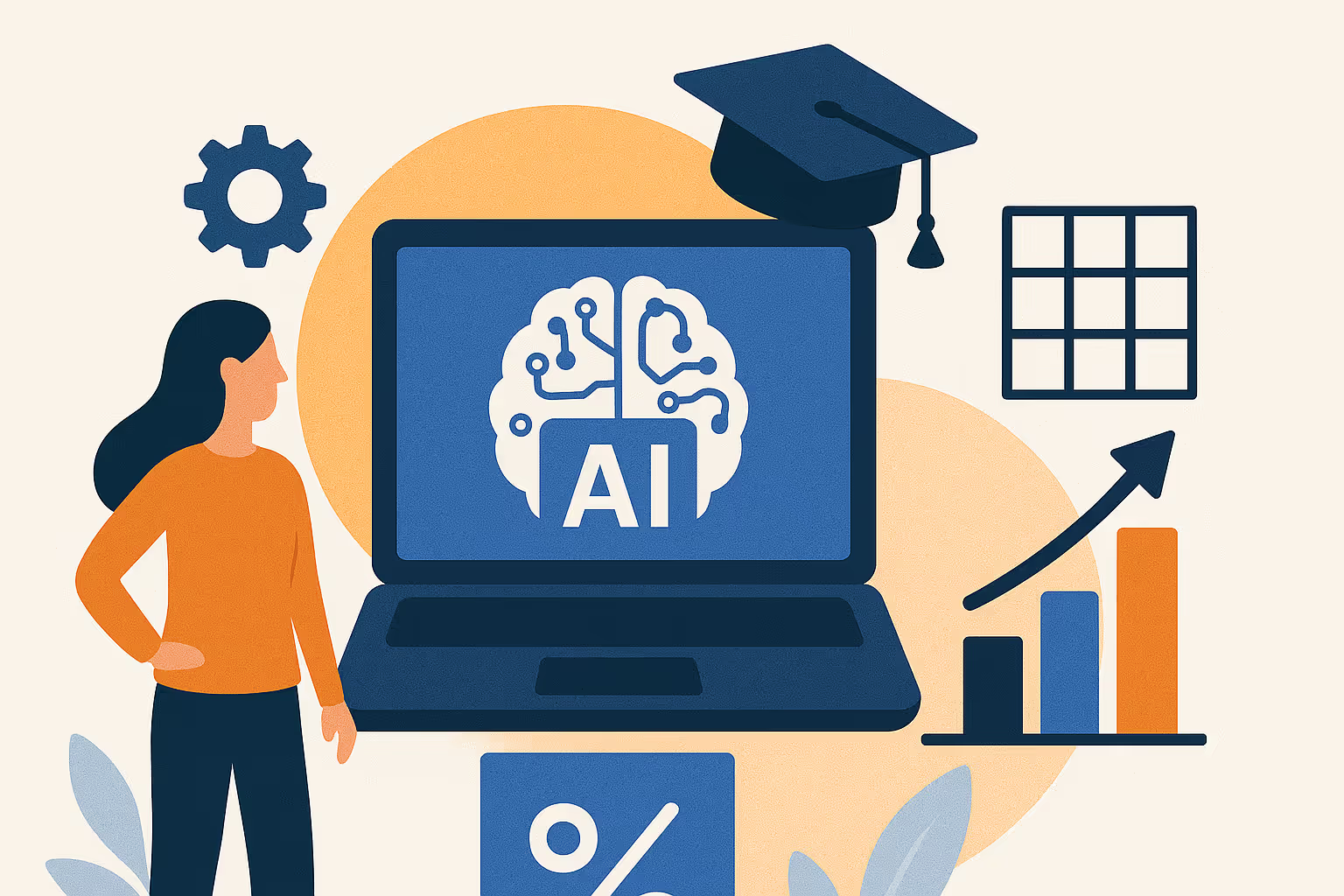About the Blog
A prospective student visits your college website and types, “What will I learn in Business Management 101?” Instead of navigating endless pages, they get a clear, direct answer with links to related programs, clubs, and internships—thanks to AI-powered search.
In a recent episode of The Higher Ed Pulse podcast, hosts Seth Odell and Mallory Willsea explored how AI is revolutionizing higher education websites. Along with insights from the Bolt Discovery Webinar, they discussed how tools like Element451’s generative AI solution enhance information discovery and student engagement.
This blog reveals how AI-driven site search transforms student engagement, discoverability, and conversions, empowering institutions to modernize their websites.
Strategies to Maximize Engagement with AI-Powered Site Search for Higher Education Websites
- Boost Discoverability with AI-Powered Search: Implement an AI-powered site search that allows students to ask natural, conversational questions and receive direct answers. This type of tool can vastly improve accessibility for international students and those unfamiliar with your site. Start by identifying the most frequently searched topics and structuring answers that guide students through complex or hard-to-find information.
- Shift from Links to Solutions: Move away from basic keyword search to AI-driven semantic search, where students can quickly find the exact information they need. Prioritize creating a searchable database with comprehensive information on programs, career outcomes, and student opportunities. Test common questions to ensure students get clear answers and paths to the next steps, keeping the experience fast and intuitive.
- Capture Interest Seamlessly for Higher Conversions: Use embedded lead-capture forms within the AI search experience. Make sure students can request more information or schedule a visit directly within search threads, without needing to leave the experience. Identify key points in search journeys, such as program details or campus events, where a call-to-action can convert passive interest into active engagement.
- Build and Maintain a Centralized Knowledge Base: Integrate diverse content types, like FAFSA resources, program descriptions, and FAQs, into a central AI-accessible knowledge base. Keep content up-to-date and include multimedia, such as videos, to enhance the student experience. Regularly audit this knowledge base to ensure all responses remain accurate and relevant as programs or policies evolve.
- Future-Proof Your Site with AI: Use AI-powered search not only to improve user experience today but to build a more resilient website for the future. Embrace AI as a way to simplify your site structure, making it student-focused and adaptable as technology and user expectations continue to shift. Plan periodic updates to the AI capabilities to keep your site at the cutting edge of user engagement in higher ed.
Why Traditional Website Navigation Falls Short
Traditional higher education websites are often compared to "closets that haven’t been cleaned out." They serve multiple audiences, which results in overly complex navigation. As Seth highlights, users often resort to Google to find specific information on an institution’s website because internal search functions are not intuitive. This challenge is amplified for international students or those unfamiliar with higher education terminology. The reliance on outdated information architectures leaves institutions at a disadvantage, frustrating users and leading them to look for answers on competitor sites.
The Role of AI in Revolutionizing Site Search
In response to these challenges, Mallory and Seth explore how AI-powered site search, such as Element 451’s Bolt Discovery, is changing the game.
Unlike traditional search, AI-driven tools provide direct answers to user queries by drawing on an institution's curated knowledge base, including program descriptions, admission details, and even external sources like FAFSA resources. This functionality transforms a static search into an interactive, engaging experience where users can ask detailed questions and receive relevant answers, similar to interacting with a conversational chatbot. This dynamic experience not only holds users' attention but can also direct them to related information, like upcoming events or application deadlines.
Capturing Interest in Real Time
One of the most innovative features of AI-powered search is its ability to embed lead-capture forms directly into search results.
As Seth notes, capturing user interest in real-time is invaluable for institutions. For example, if a prospective student is browsing program details, they might be prompted to submit a request for information or sign up for an open house event within the search flow. This streamlined approach improves conversion rates by removing friction in the process and avoiding outdated inquiry forms that don’t match today’s user expectations. With features like personalized follow-up questions, AI-powered site search turns each query into a potential interaction, keeping users engaged on the institution's website.
Forsyth Tech Community College enhanced their higher education website with Element451’s AI-powered site search, Bolt Discovery, significantly streamlining recruitment processes. This advanced search tool reduced the Student Care Team’s workload by answering general information inquiries directly on the website.
Implementing automated workflows facilitated a smoother conversion of prospects into applicants, with a 25% conversion rate within the first three weeks.
This automation contributed to a 7.5% increase in enrollment since its implementation and an 11.7% increase from 2019 to fall 2023 — the highest level since spring 2014 — illustrating the platform's effectiveness in enhancing recruitment efforts and driving enrollment growth
Optimizing Content Management with an AI Knowledge Base
Managing a knowledge base to support AI search might sound complex, but today’s tools make it easier.
Institutions can load various content types — program catalogs, PDFs, and even YouTube videos — into a central database from which AI can draw. Mallory mentions that by allowing AI to use predefined sources, administrators ensure that search results are accurate and continually updated. This approach also makes it easier for students to get comprehensive answers about everything from financial aid to housing, without combing multiple pages. Institutions are empowered to curate their knowledge base to reflect current and relevant content, ensuring consistency and ease of management.
Preparing for a Future Without Traditional RFIs
The power of AI-powered search lies in its ability to provide instant answers, which may reduce the need for traditional Request for Information (RFI) forms.
Seth reflects on the potential of AI to eliminate the outdated RFI process, which often leaves students waiting for responses. Instead, AI search empowers students to find the information they need instantly. As Mallory suggests, institutions should imagine a future where RFI functions are seamlessly embedded within the search experience, leading to real-time conversions. This change could lead to more "stealth applications," where students move from inquiry directly to application without formal engagement with admissions staff—an emerging trend that underscores the importance of a robust, self-service website.
AI-powered search offers higher education institutions a forward-looking approach to engaging with students, making websites more intuitive, accessible, and student-centered. With Bolt Discovery and similar tools, colleges, and universities can now turn their websites into proactive, high-conversion tools that empower students to explore, engage, and apply — all in real-time.
Discover how AI-powered site search can enhance engagement on higher education websites. Check out The Higher Ed Pulse episode for insights, and visit Enrollify for more strategies.
Frequently Asked Questions (FAQs):
What is AI-powered site search, and how does it work on higher education websites?
AI-powered site search is an intelligent search technology that uses machine learning and natural language processing to deliver highly relevant, personalized search results on higher education websites by understanding user intent and context.
How can AI-powered site search improve student engagement and enrollment?
AI-powered site search enhances student engagement and enrollment by streamlining the discovery of relevant information, improving user experience, and guiding prospective students toward key decision-making content like programs and application steps.










